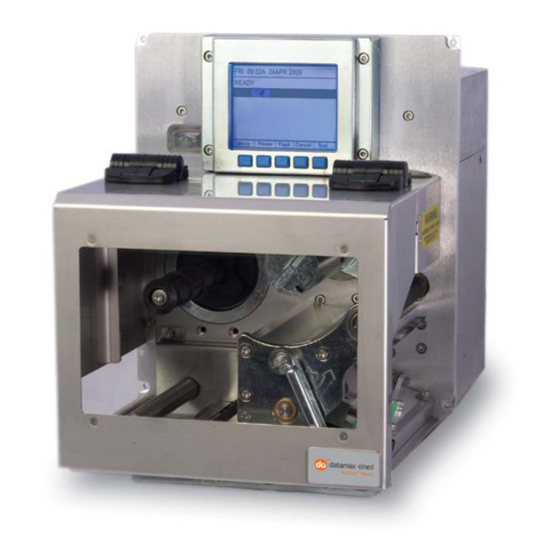Datamax A-Class Mark II Panduan Memulai Cepat - Halaman 6
Jelajahi secara online atau unduh pdf Panduan Memulai Cepat untuk Pembaca kode batang Datamax A-Class Mark II. Datamax A-Class Mark II 6 halaman. Rfid-equipped printers

Step 4: RFID Programming Modes
The printer features two different operational modes for RFID tag programming:
Direct Mode allows the user (Host) to control the reading and writing of the RFID tag directly.
Containing both a generic read/write interface and a high-level tag UHF-specific interface, each RFID
tag is individually processed with status and data responses.
Label Formatting Mode utilizes the current printer configuration to process all the reads, write, and
exception processing for each tag printed. (For exception processing and fault handling details, see
the Operator's Manual.) The specification for the RFID operation is contained in the data fields of a
DPL label format, instructing the printer to write data, read data, and update selective fields prior to
printing the label. This mode supports automatic increment and decrement commands for numeric,
alphanumeric, or hexadecimal.
Notes: (1) Both programming modes will auto-position the label to the RFID tag location.
(2) Reference the Class Series Programmer's Manual for detailed RFID programming information.
Diagnostics
The following features can be found in the printer's User Menu under DIAGNOSTICS. (From
DIAGNOSTICS go to OPTIONS TESTING, then TEST RFID, and finally TEST UHF.)
Note: If, upon selection, the RFID module is not equipped or is not communicating with the printer, the
display will indicate NOT INSTALLED. In this case, go to PRINTER OPTIONS / MODE and ensure
that the option is enabled.
•
TAG DATA – This acts as an RFID reader, allowing the printer to read and display the data. If the
tag cannot be found after ten tries, the message CANNOT READ RFID TAG will be displayed.
•
DEVICE VERSION – This queries then displays the serial number and the firmware version of
the RFID programming device, and is useful for verifying proper device communication with the
printer.
5
